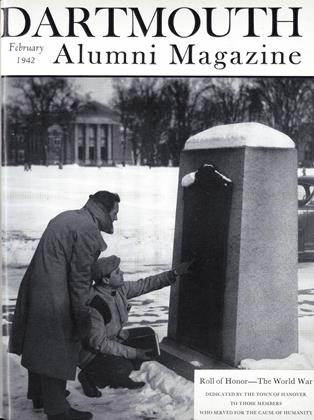HE'S SITTING IN THE BACK ROW AND THE class hour is half over. He is looking in the general direction of the instructor but before his eyes is the deck of a destroyer. The officers and crew are lined up. The commander calls: "Ensign Jones!" He steps forward. "We have selected you to lead a hazardous landing party. You will select your men, take a small boat, and as soon as it is dark tonight you will.
The outlines on the blackboard are getting complicated. Another student sees them but he was 20 last month. Next month he will register and he is Class A-1 material for the Draft. He stops following the instructor's voice for a moment to go over again that long talk with his folks during vacation. "Yes, I'll stick it out, Dad. Don't worry—l know I should stay in college and I'll go back to Hanover for the summer term.". .. .But there's no end to those thoughts and that itchy feeling ever since Pearl Harbor.
The teacher turns again to glance at the notebook of a student in the first row. He's busy but not with note-taking. Under strokes of his pencil a rough map of the Far East is taking shape Hawaii, Midway, Tokyo, Singapore, the Indies, Australia.
The bells in the tower of Baker Library ring out, clear and strong through the sharp air of a zero day. Now the room hums with activity. Sheepskins and parkas are pulled on. The corridors and stairs, for a few moments, are filled with a jostling crowd, shuffling in heavy shoes, lighting cigarets, calling "Hi!", hurrying back to the room, or on to the next class The teacher goes over his notes, adding a new head, crossing off a whole section that didn't go so well and must be improved in the class coming up The chairs are filling again, jackets piled under the frosted windows. The room is hushed. A last minute arrival enters and closes the door as the deep Bong! Bong! of the big bell sounds the seven minute signal and the class and the teacher—get down to business.
THIS GOES ON ALL THE TIME. Had you forgotten? The bells send crowds of students across the campus and back again every hour. But they also summon men to teaching platforms where they are expected to be stimulating, accurate, profound, witty, and wise. The instructor can't be late to his appointment if he is late the class, is gone. He has no cuts. He doesn't feel sorry for the boys who have to get up for an 8 o'clock he was fixing the furnace at 6:30. Because there is a certain amount of ground to be covered by him and his students in every class exercise he can't postpone tackling a tough assignment. Nor can he say "That will be all for now Miss So-and-so. We'll finish the rest later."
The teacher has to produce before a critical audience, several hours a day, week after week. He does produce, with a strict adherence to high standards, and with more difficulties to be squarely faced and patiently solved than he is often enough given credit for.
WE HAVE USED BEFORE now the statement that is credited to Ben Ames Williams '10 to the effect that association with Dartmouth is a lifetime affair, and that men are students for only four years and alumni for fifty. No better guidance can be given to undergraduates than to emphasize that they will many of them be in uniform for a few years and in civilian life for many years. Sticking to the job of preparing themselves for that long-term life can be finished now. They won't catch up later. With its greatly speeded up program the College, for its part, is going to do everything within its power to help students finish the course and earn their degrees in a much shorter time.
Teachers and students need all the strength of convictions such as these that they can muster. Sticking to the job in these days calls for self-discipline of a tough-fibered variety that will command men to make important those things that need to be done in the next hour and the next day, even though they seem unimportant or not exciting.
A DISTINGUISHED REVIEWING STAND TWENTY-FIVE YEARS AGO The Dartmouth regiment of the S.A.T.C. of World War I was reviewed at the SeniorFence by a group of army officers, at left, and members of the Board of Trustees who areshown above beginning with President Hopkins (center), Albert O. Brown '78, LewisParkhurst '78, John K. Lord '68, John M. Gile 'By, Frank S. Streeter '74, and Sanford H.Steele '70 (last at right).
 View Full Issue
View Full Issue
More From This Issue
-
 Article
ArticleUseless Dartmouth Information
February 1942 By LEON BURR RICHARDSON '00 -
 Sports
SportsBig Green Teams
February 1942 -
 Article
ArticleDartmouth Keeps 'Em Flying
February 1942 By MAJOR WILLIS S. FITCH '17 -
 Class Notes
Class Notes1917*
February 1942 By EUGENE D. TOWLER -
 Class Notes
Class Notes1918*
February 1942 By ERNEST H. EARLEY -
 Class Notes
Class Notes1937*
February 1942 By DONALD C. MCKINLAY
The Editor
-
 Article
ArticleNearly Seven Thousand
October 1935 By The Editor -
 Article
ArticleGradus Ad Parnassum
June 1937 By The Editor -
 Article
ArticleNEW FASHIONED WINTER
February 1938 By The Editor -
 Article
ArticleAlumni and Faculty
April 1940 By The Editor -
 Article
ArticleWhy No R.0.T.C.?
November 1940 By The Editor -
 Article
ArticleAlumni in Service
June 1941 By The Editor
Article
-
 Article
ArticleES-21 Projects Shown
JANUARY 1971 -
 Article
ArticleFilmmaker Earns Kudos
Mar/Apr 2002 -
 Article
ArticleTour Guide to the Stars
JANUARY | FEBRUARY 2016 By —Heather Salerno -
 Article
ArticleTuck School
MAY 1966 By BILL BARNET T'65 -
 Article
ArticleA New Landscape
APRIL 1999 By John A. Menge -
 Article
ArticleCONCERT SERIES
MAY 1931 By Wilbur H. Ferry '32

